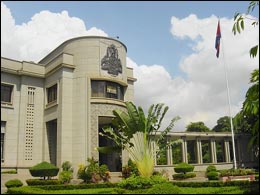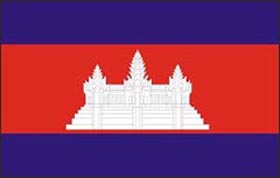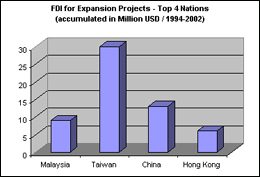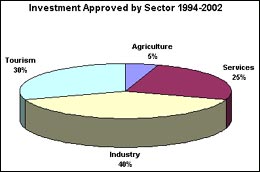 HISTORIC
HISTORIC |
In 1994, the Law on Investment of the Kingdom
of Cambodia was passed with the aim of streamlining
the investment regime and providing generous and
competitive concessions for direct private sector
investment. This Law also created the Council
for the Development of Cambodia (CDC), a one-stop
service organization for investment in Cambodia.
The CDC, being the highest decision-making level
of the government on private (CIB) and public
(CRDB) Investments, it is directly chaired by
the prime minister. Its board is composed of all
ministers of the Royal Government of Cambodia.
The Cambodian Investment Board (CIB), has been
designated as the one-stop service of the government,
its main task is to effectively promote and facilitate
investment trough a speedy approval procedure
and very competitive incentive packages. The final
objective of this policy being to create employment,
increase national productivity and competitiveness
to achieve a sustainable socio-economic development.
 GOVERNMENT POLICY
GOVERNMENT POLICY |
Cambodia is one of the poorest countries in the
region and international assistance remains a
vital component in overcoming the challenges faced
in Cambodia's development. Nevertheless, private
sector investment is becoming increasingly important
for the country as the private sector assumes
its position as the main engine for economic growth
in Cambodia. The Royal Government of Cambodia
sees private sector investment as vital to the
development of a fully democratic and prosperous
Cambodia in the years ahead.
 INTEGRATION INTO REGIONAL AND WORLD ECONOMY
OF CAMBODIA
INTEGRATION INTO REGIONAL AND WORLD ECONOMY
OF CAMBODIA |
Cambodia has obtained "Generalized System
of Preferences (GSP)" and "Most Favoured
Nation (MFN)" status from its major trading
partners, including the European Union, the USA,
Japan, Canada, and Australia. Cambodia also participates
actively in the GMS development and is part of
the ASEAN since 1999. Furthermore Cambodia is
the first LDC to have integrated the World Trade
Organisation in September 2003. The remaining
objectives to achieve are the following:
· Integration to the AFTA/CEPT
· AIA
 ACCESS TO SOURCES OF FINANCEMENT
ACCESS TO SOURCES OF FINANCEMENT |
Apart from facilitation and support at the national
level, attention is also being given by the government
to opening up access to international sources
of finance for private sector investment. Cambodia
is already affiliated to the IFC and MIGA. It
has also signed agreements with the ADB, providing
private sector investors with the opportunity
to obtain funding for their investment projects
from this international financing institution.
 CDC A ONE STOP SERVICE WITH AN OPEN DOOR POLICY
CDC A ONE STOP SERVICE WITH AN OPEN DOOR POLICY
|
· Information and Application
· Analysis and evaluation
· Approval
· Customs duty and Tax Exemption
· Visa and Work Permits
· Company Registration

 SPIRIT OF THE INVESTMENT LAW
SPIRIT OF THE INVESTMENT LAW |
· Job Creation
· Export-Oriented policy
· Free Market System
· Open and Outward-Looking Economy
· Conductive Environment
· Integration into the regional and World
Economy
Investor's treatment:
The 1994 Law on Investment provides similar treatment
to foreign and domestic investors, with the exception
of land ownership, as set forth in Cambodia's
constitution. Even in this area, the regulations
are generous, with foreign investors able to lease
land for a period of up to 70 years.
The government provides investors with a guarantee
neither to nationalize foreign-owned assets, nor
to establish price controls on goods produced
and services rendered by investors, and to grant
them the right to freely repatriate capital, interest
and other financial revenues.
Investors can set up 100% foreign-owned investment
projects and employ skilled workers from overseas,
in cases where these workers cannot be found in
the domestic labor force.
In addition, the Law on Investment and its related
Sub-Decrees grant generous incentives to investors,
especially those concerned in investment projects
geared towards exports.
Attention is also accorded to private investment
in Build-Operate-Transfer (BOT) projects, and
private investment in infrastructure, including
public utilities such as electricity, water supply
and telecommunications, a successful example of
this policy is the Phnom Penh and Siem Reap airports
realized in partnership with Vinci.
Latest investment regulations in Cambodia
2000/2003
Cambodia has approved the latest Amendment to
the law on Investment on February 23rd, 2003,
which governs all Qualified Investment Projects
(QIP) and defines procedures by which any person
establishes a Qualified Investment Project.
Our policy is concentrated on seven main points;
1- Continue to develop labor-intensive
industries, such as garment, toys and footwear.
2- Promote the development of agro-business
by strengthening legal framework for long-term
land management. The government will provide incentives
to establish factories to process agricultural
products, such as cotton, jute, sugar, palm oil,
cashew nuts, rubber, cassava and fruits.
3- Develop industries based on the utilization
of basic natural resources, mainly by processing
the existing natural resources in the country
such as fish, meat, cement production, brick and
tiles.
|
4- Promote Small and Medium Enterprises
(SME's), micro-enterprises and handicraft. The
critical issue for SME's is to provide micro financing,
streamline procedures, provide marketing services
and supply information on sectorial development.
5- Encourage the transfer of technology
and diversification of export products by promoting
the assembly of electrical and electronic appliances.
6- Establish an environment conducive
to a sustainable development in which the private
sector has been identified and entrusted as the
engine for growth. The Government will play the
role of policy maker and facilitator for an accelerated
and expended private sector involvement in the
rehabilitation and development of the country.
7- Encourage the corporate sector and
SME's as its partners in engineering growth and
to be the locomotive to pull our economy on the
right track. We aim to take maximum benefit from
economic integration and foreign trade by maintaining
the current liberal trading regime, which allows
Cambodia to integrate economically with the rest
of the world.
The adoption of these strategies is meant to
attract and promote more investment to Cambodia
and further expend international markets for Cambodian
products. More importantly, they will also speed
up the liberalization and modernization of the
national economy and increase its competitiveness
to meet regional and international standards.
 ADMINISTRATIVE PROCEDURES
ADMINISTRATIVE PROCEDURES |
1 - Investment Application (Prior Approval)
All investors wishing to obtain privileges and incentives
for their investments are required to apply for
prior approval from the CDC.
Application Submission
Duly complete application must be signed and submitted
by the applicant, or by a representative of the
applicant authorized by a certified power of attorney
executed in favour of the representative, and
submitted to the CDC for review and consideration.
A certified copy of any power of attorney must
be produced at the time of the submission of the
applicant.
Requirements for Application
Application documents: A completed application
should include one set of the following documents:
1) A completed application, in the form
prescribed by the CDC and signed by a dully authorized
representative of the applicant, Whose power of
the attorney is attached;
2) A letter stating the intention of the
applicant to invest in Cambodia, with a brief
summary of the investors, the investment project,
the objectives and any special requests to the
CDC regarding investment project;
3) The constituent documents of the proposed
investment enterprise, such as the Memorandum
of association and articles of Association, in
accordance with the existing laws of Cambodia;
4) A detailed study of the economic and
technical feasibility of the investment enterprise,
including an outline of the manufacturing flow
I. Details of the qualifications of the
applicant, including:
II. Technical capacity;
III. Marketing capacity;
IV. Human resources and managerial capacity;
and financial capacity.
 INVESTMENT PROMOTION AND INCENTIVES
INVESTMENT PROMOTION AND INCENTIVES |
· 20% corporate Income Tax
· Tax Holiday up to 8 years
· 5 years Loss Carried Forward
· Full Import Duty Exemption
· No Export Tax
· Free Repartition of Profit
· No Withholding Tax on Dividends
· Land Lease up to 70 year; Renewable
· No Nationalisation and Price Control
 WHY TO INVEST IN CAMBODIA?
WHY TO INVEST IN CAMBODIA? |
· Competitive Investment Incentives
· Pro-Business Government
· One Stop Service - Fast-Track Investment
Approval Process
· Low Labour Cost
· Access to ASEAN and World Markets
· Preferential Trading Status
· Sound Macro-economic Environment
· Strategic Location to Serve the Mekong
6

 TRENDS IN FDI
TRENDS IN FDI |
Investment flows for Cambodia are attributable
to 876 projects. Net foreign investment in Cambodia
peaked in 1995 with the amount of US$ 1,909,597,365.
The average net foreign investment during 1996
- 2001 was estimated to be around 374 million
per annum. FDI has been recorded at US$ 139,549,798
in 2001, sharing 70% of the total approved projects'
investment of US$ 197,710,415 in 2001. The manufacturing
sector, in particular the textile industry, accounts
for the largest share of the overall FDI.

Even if there is a decline in FDI in Cambodia
the existing investors have managed to expand
their projects at a total project cost of approximately
US$ 90 million during the period of 2000 to 2002.
Sources of FDI
In terms of major foreign investing nation, the
top three sources are Malaysia, Taiwan, and United
States of America.
Graphic
Sectors of Investment

|

